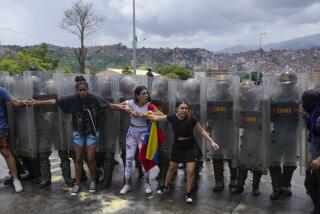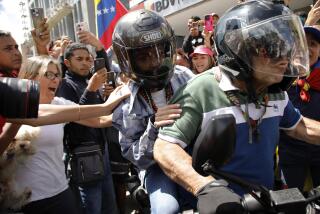Amid Tension and Rumors of Violence, Chileans Vote Today on Pinochet
- Share via
SANTIAGO, Chile — In a climate of tension and rumors of looming conflict, Chileans decide today whether to give Gen. Augusto Pinochet eight more years in power or to resume multi-party democratic rule.
The government assured a fair ballot--a simple yes-or-no vote on Pinochet, the lone candidate. The opposition coalition expressed confidence that the plebiscite would be untainted by fraud, thanks to elaborate safeguards, including two parallel computerized tallies.
However, senior officials in the No campaign voiced fears that pro-Pinochet forces plan to provoke violence tonight, allowing the government to impose a state of siege and annul the vote before the result is announced.
In Washington, State Department spokeswoman Phyllis Oakley said Tuesday that the United States has received assurances from the Chilean Embassy in Washington and the Ministry of Interior in Santiago that the plebiscite “will be carried out as scheduled and that its results will be respected.”
U.S. Expressed Concern
But on Monday, Oakley had said: “We are aware of reports that the Chilean government plans to cancel the plebiscite or nullify its results, and we take them seriously.” She said the State Department had called in the Chilean ambassador Sunday to express its concern.
Interior Minister Sergio Fernandez dismissed the reports as “a coarse ploy by the opposition to mislead foreign countries. . . . Nothing will prevent the full completion of this act.”
Both sides, meanwhile, insist they will win. The No forces have remained united since they banded together in February and have been more persuasive in predicting victory.
They cite opinion polls giving them a substantial lead, in part because of 15 minutes of virtually uncensored publicity every night on television for each side. The opposition had a rare opportunity to state its case: that a Yes vote is for continued dictatorship and a No vote for a return to democracy.
“We had 15 minutes a day to confront 15 years of Pinochet, and we took advantage of it,” said Ricardo Lagos, president of the left-of-center Party for Democracy.
Pinochet, for his part, portrays himself as the guarantor of stability, economic growth and democracy, saying that a No victory would mean a return to the turmoil of 1970-73 under Marxist President Salvador Allende, who died during Pinochet’s coup. The government insists that Communists lurk behind the moderate No Command leaders and that they will seize control of the government if Pinochet loses.
Opposition leaders suggested that the government might resort to power blackouts and infiltrate street celebrations to provoke violence tonight, while some analysts speculated that the opposition might be trying to forestall problems by airing the rumors.
Police sources blamed terrorist bombs for a widespread blackout Tuesday night. No injuries were reported. Cities from Tal Tal, 690 miles north of Santiago, to Puerto Montt, 650 miles to the south, were hit by the outage, authorities said, but some communities in between were unaffected or suffered only a flickering of lights.
“Pinochet is a man who could do anything when faced with defeat,” said Andres Zaldivar, vice president of the Christian Democratic Party, Chile’s largest party.
Shoppers Stock Up
The rumors heightened tensions in Santiago after a monthlong campaign that reawakened debate on Allende’s term and on the 15 years under Pinochet. Shoppers raced to stock up on food and depositors withdrew extra cash from banks, while Santiago’s chronic traffic jams were worse than usual.
Even if he loses, Pinochet retains broad powers under the constitution drafted by the military in 1980. He will remain president for a year, commander in chief of the army for at least four years and a senator for life.
The constitution, which outlaws Marxist parties, is virtually impossible to amend, and the new Congress, to be elected in December, 1989, has limited powers. Pinochet or a surrogate could still win the presidency in the next election if the opposition fractures.
But the No coalition, ranging from right of center to left, has sought to make the vote a referendum on military rule and the constitution itself, as well as on Pinochet’s candidacy. If the No prevails, the opposition will press for negotiations with the armed forces on amending the constitution to allow open elections and a transition to fully democratic rule.
Given their unity thus far, No Command leaders are confident that they can choose a single opposition candidate to oppose the government candidate in a subsequent open election. Many suspect that the military would not be willing to stake its future on a defeated 72-year-old general and would opt for negotiations.
Pinochet’s foes stress that the government has used its overwhelming domination of the media and municipal government to muster support. After the formal campaign ended Sunday, national television devoted hours to news programs highlighting government achievements and red-tinted footage of the havoc under Allende.
Yet the vote itself is likely to be clean, in keeping with Chilean tradition until the coup. Juan Ignacio Garcia, head of the Election Service, is highly regarded in Chile and by many of the foreign observers here to watch the vote. Garcia also ran the 1970 election, which Allende won with 36% of the vote.
Garcia’s officials have overseen the complete reregistration of the electorate since the old voting rolls were burned after the coup. A total of 7,435,913 voters signed up, 92% of those eligible in this country of 12.7 million people.
Two opposition party members will monitor the count at each of the 22,247 voting tables in the country. Results will be sent from the 1,000 polling stations to headquarters of the Christian Democrats and the Party for Democracy in Santiago to back up the government count.
Alberto Cardemil, the deputy interior minister, told a group of foreign reporters--there are more than 1,600 in Chile for the plebiscite--that the country had gone through an emergency government from 1973 to 1981, followed by an authoritarian government.
“The plebiscite is the door that opens to a new political phase, one of integral and full democracy,” he said. “We must pass through this door cleanly, fairly and transparently.”
More to Read
Sign up for Essential California
The most important California stories and recommendations in your inbox every morning.
You may occasionally receive promotional content from the Los Angeles Times.













